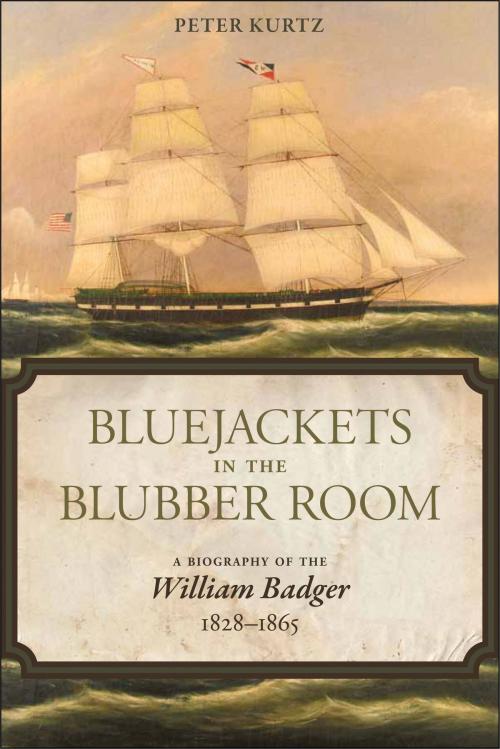Bluejackets in the Blubber Room
A Biography of the William Badger,1828-1865
Nonfiction, History, Military, Naval| Author: | Peter Kurtz, Peter Kurtz | ISBN: | 9780817386450 |
| Publisher: | University of Alabama Press | Publication: | November 28, 2012 |
| Imprint: | University Alabama Press | Language: | English |
| Author: | Peter Kurtz, Peter Kurtz |
| ISBN: | 9780817386450 |
| Publisher: | University of Alabama Press |
| Publication: | November 28, 2012 |
| Imprint: | University Alabama Press |
| Language: | English |
Bluejackets in the Blubber Room explores key events in US maritime history from the 1820s to the end of the Civil War through the biography of the sailing ship William Badger.
Taking a biographical approach to his subject, Peter Kurtz describes three phases of the life of the William Badger, a sailing ship with a long and exemplary life on the sea: first as a merchant ship carrying raw materials and goods between New England, the US South, and Europe; second as a whaling ship; and finally as a supply ship providing coal and stores for the North Atlantic Blockading Squadron in Beaufort, North Carolina, during the Civil War.
Kurtz begins Bluejackets in the Blubber Room by exploring early American shipbuilding and shipbuilders in the Piscataqua region of Maine and New Hampshire and the kinds of raw materials harvested and used in making the wooden sailing ships of the time. After its construction, the Badger became part of the key economic trade between New England, the US South, and Europe. The ship carried raw materials such as timber from New England to New Orleans and subsequently cotton from New Orleans to Spain and Liverpool, England. Using ship logs, sailors’ accounts, and other primary sources, Kurtz delves into both the people and the economics of this critical “cotton triangle” trade.
Following service as a merchant ship, the Badger became a whaling ship, carrying its New England–based crew as far as the South Pacific. Kurtz presents a colorful story of life aboard a whaling ship and in the whaling towns ranging from Lynn, Massachusetts, to Cape Leeuwin, Australia. Finally, Kurtz describes the last phase of the Badger’s life as a key player as a supply ship in the Union Navy’s blockade effort. Although not the most dramatic duty a sailor could have, blockade supply nevertheless was critical to the United States’ prosecution of the Civil War and eventual victory. Kurtz examines the decision-making involved in procuring such ships and their crew, notably “refugees” and escaped slaves known as “contrabands.”
Bluejackets in the Blubber Room explores key events in US maritime history from the 1820s to the end of the Civil War through the biography of the sailing ship William Badger.
Taking a biographical approach to his subject, Peter Kurtz describes three phases of the life of the William Badger, a sailing ship with a long and exemplary life on the sea: first as a merchant ship carrying raw materials and goods between New England, the US South, and Europe; second as a whaling ship; and finally as a supply ship providing coal and stores for the North Atlantic Blockading Squadron in Beaufort, North Carolina, during the Civil War.
Kurtz begins Bluejackets in the Blubber Room by exploring early American shipbuilding and shipbuilders in the Piscataqua region of Maine and New Hampshire and the kinds of raw materials harvested and used in making the wooden sailing ships of the time. After its construction, the Badger became part of the key economic trade between New England, the US South, and Europe. The ship carried raw materials such as timber from New England to New Orleans and subsequently cotton from New Orleans to Spain and Liverpool, England. Using ship logs, sailors’ accounts, and other primary sources, Kurtz delves into both the people and the economics of this critical “cotton triangle” trade.
Following service as a merchant ship, the Badger became a whaling ship, carrying its New England–based crew as far as the South Pacific. Kurtz presents a colorful story of life aboard a whaling ship and in the whaling towns ranging from Lynn, Massachusetts, to Cape Leeuwin, Australia. Finally, Kurtz describes the last phase of the Badger’s life as a key player as a supply ship in the Union Navy’s blockade effort. Although not the most dramatic duty a sailor could have, blockade supply nevertheless was critical to the United States’ prosecution of the Civil War and eventual victory. Kurtz examines the decision-making involved in procuring such ships and their crew, notably “refugees” and escaped slaves known as “contrabands.”















